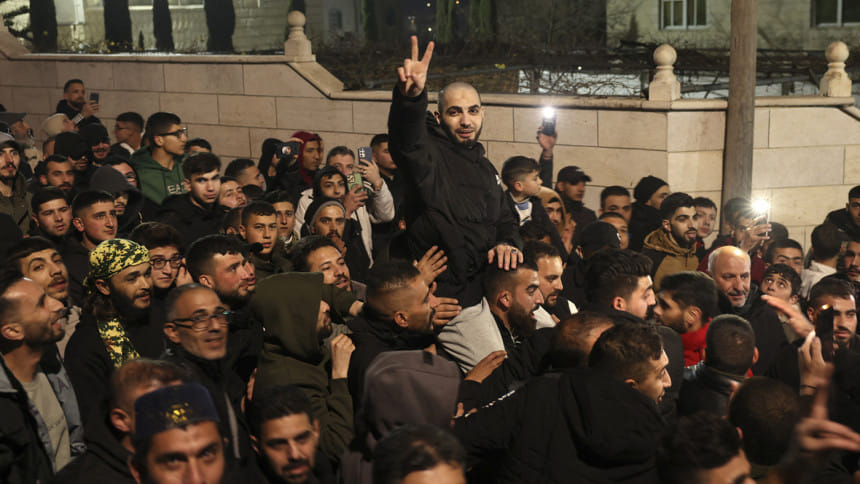Fragile Gaza truce enters second week

A fragile truce aimed at ending the war in Gaza entered its second week on Sunday, after four Israeli hostages and around 200 Palestinian prisoners were released to joyful scenes.
While Israel and Hamas completed on Saturday their second hostage-prisoner swap under the ceasefire deal, a last-minute dispute blocked the expected return of hundreds of thousands of displaced Palestinians to the Gaza Strip's devastated north.
Israel announced that it would block Palestinians' passage to the north until a civilian woman hostage who the prime minister's office said "was supposed to be released" on Saturday walks free.
A Hamas source told AFP that the woman, Arbel Yehud, will be "released as part of the third swap set for next Saturday".
The dispute highlighted concerns over the next phases of the three-stage truce deal, which took effect on January 19.
The deal's second phase is to see negotiations for a permanent end to the war, but analysts have warned it risks collapsing because of the deal's multi-phase nature and deep distrust between Israel and Hamas.
During the first six-week phase, 33 hostages should be freed in staggered releases in exchange for around 1,900 Palestinians held in Israeli jails.
A total of seven hostages and 289 Palestinians have so far been released under the deal, as well as one Jordanian prisoner freed by Israel.
Waiting to return home
In Gaza, Palestinian police prevented hundreds of displaced people from reaching the Israeli-controlled passage to the north, where Israeli tanks and armoured vehicles were blocking the road.
Rafiqa Subh, waiting to return to Beit Lahia, said: "We want to go back, even though our houses are destroyed. We miss our homes so much."
Subh said she would wait to be allowed back into the north "even if we have to sleep by the checkpoint".
The Israeli military's Arabic-language spokesman Avichay Adraee said Gazans were not allowed to approach the Netzarim Corridor, through which they have to pass to reach their homes in the north, "until it is announced open".
"These instructions will remain in effect" until further notice and until "Hamas fulfils its commitments", Adraee said, echoing Israeli claims that Hamas was in breach of the agreement by not handing over Yehud.
Among those trying to return Saturday was Samia Helles, a 26-year-old from Gaza City.
"So far, I don't know whether my house is still standing or destroyed. I don't know if my mother is alive or dead. I haven't been able to contact her for a month," she said.
The truce has brought a surge of food, fuel, medicines and other aid into rubble-strewn Gaza, but the UN says "the humanitarian situation remains dire".
'Until the last hostage'
The four hostages released on Saturday, all women soldiers, were reunited with their families and taken to hospital, where a doctor said they were in a stable condition.
Of the 251 hostages seized during Hamas's October 7, 2023 attack which triggered the war, 87 remain in Gaza including 34 the military says are dead.
Some Israelis fear for the fate of the remaining hostages as far-right members of Prime Minister Benjamin Netanyahu's ruling coalition oppose the ceasefire.
Hours after Saturday's hostage release was completed, thousands of protesters gathered in Tel Aviv, as they have done weekly throughout the war, to pressure the authorities to secure the release of hostages.
An AFP correspondent said the demonstrators chanted in support of the return of all remaining hostages, including those not slated for release during the first phase of the truce.
"The families cannot breathe. We are under immense stress... We will do everything, we will fight until the end, until the last hostage" returns, said Ifat Kalderon, whose cousin Ofer Kalderon is still held in Gaza.
Efrat Machikava, niece of hostage Gadi Mozes, said that "our hearts are filled with joy for the four hostages who returned to us today, but we are extremely concerned for our loved ones still held in terrorist captivity."
The October 7, 2023 attack resulted in the deaths of 1,210 people, mostly civilians, according to an AFP tally based on official Israeli figures.
Israel's retaliatory offensive has killed at least 47,283 people in Gaza, the majority civilians, according to figures from the Hamas-run territory's health ministry which the United Nations considers reliable.

 For all latest news, follow The Daily Star's Google News channel.
For all latest news, follow The Daily Star's Google News channel. 








Comments